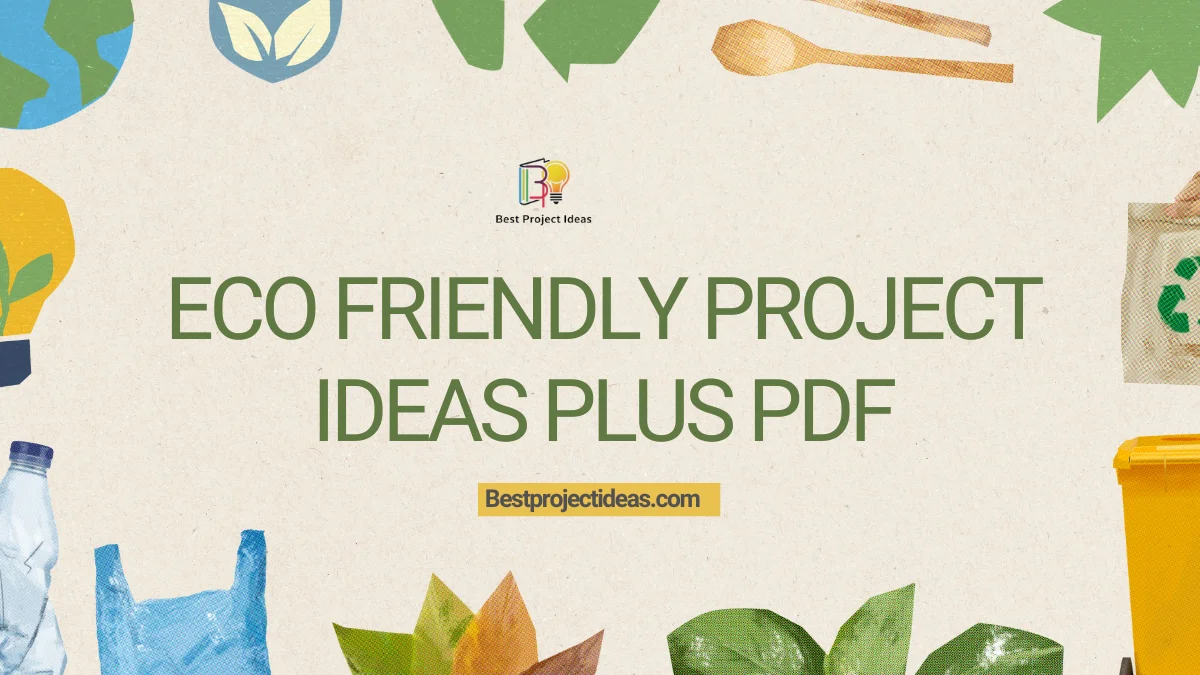
Eco-Friendly Project Ideas help make our world better. They are about being nice to our planet. You can have fun and make the Earth cleaner at the same time. These ideas teach us to use less energy, save things, and make less trash. Every little thing we do can add up to significant changes.
Trying these projects teaches us how to take care of nature. We can enjoy doing things that are good for everyone. It’s great to see how small steps can make our planet healthier for all of us.
Must Read: 17 Top Most Useful DSA Project Ideas That You Must Try
How Can You Make An Eco-Friendly Project?
To make an eco-friendly project, think about these key points:
- Materials: Use things that are sustainable, recycled, or upcycled.
- Energy efficiency: Add energy-saving parts or use renewable energy sources.
- Waste reduction: Cut down on waste and set up recycling plans.
- Water conservation: Include water-saving tools or rainwater collection systems.
- Local sourcing: Use resources from nearby to cut down on transportation emissions.
- Longevity: Build for durability and easy repair or maintenance.
- Biodiversity: Add features that help local plants and animals.
- Education: Include parts that teach people about environmental issues.
Eco Friendly Project Ideas For High School Students
Here’s a list of unique eco-friendly project ideas for high school students:
Energy Conservation:
- Solar-powered phone charging stations for the school.
- Wind turbine installation to power outdoor lights.
- Pedal-powered generators for classroom electronics.
- Energy audit of school buildings to find waste.
- LED bulb swap program for homes in the community.
- Thermostat adjustment campaign to save heating and cooling costs.
- Window films to reduce heat gain in summer.
- Passive solar design for a new school building.
- Solar water heaters for the school’s hot water needs.
- Energy-saving computer lab with motion sensor lights.
Water Conservation:
- A rain barrel system is used to collect water for gardens.
- Low-flow faucet and showerhead installation in school bathrooms.
- Greywater recycling system for watering plants.
- Drought-resistant landscaping around the school grounds.
- The water-saving contest between classrooms or grades.
- DIY water filtration system using natural materials.
- Rainwater harvesting system for flushing toilets.
- Xeriscaping demonstration garden with local plants.
- Fix leaky pipes and faucets around the school.
- Create a water conservation awareness campaign.
Waste Reduction:
- Plastic-free lunch program with reusable containers.
- Composting system for cafeteria food waste.
- Recycling bins with clear labels in every classroom.
- Upcycled art project using discarded materials.
- Zero-waste week challenge for students and staff.
- Repair cafe to fix broken items instead of trashing.
- Clothing swap event to reduce textile waste.
- DIY eco-friendly cleaning products for school use.
- Paper-making workshop using recycled paper scraps.
- E-waste collection drive for proper recycling.
Transportation:
- Bike-sharing program for students and staff.
- Carpool matching system for families living nearby.
- Walking school bus program for younger students.
- Electric vehicle charging stations in school parking lots.
- Skate and scooter racks to encourage alternative transport.
- No-idling zone for cars during pickup and drop-off.
- Public transit education campaign for students.
- Bike repair workshop to keep cycles in use.
- Virtual field trips to reduce bus use.
- Telecommuting options for staff on certain days.
Food and Agriculture:
- Rooftop vegetable garden for the cafeteria.
- Vertical hydroponic system for growing herbs indoors.
- Beehives to support local pollinator populations.
- Aquaponics setup combining fish and plant growing.
- Fruit tree planting project on school grounds.
- Meatless Monday program in the school cafeteria.
- Edible landscaping with fruit-bearing plants and trees.
- Vermiculture bin for worm composting in classrooms.
- Seed library for sharing heirloom plant varieties.
- Food waste tracking system for the cafeteria.
Habitat Conservation:
- Native plant garden to support local wildlife.
- Bird feeders and baths are made from recycled materials.
- Butterfly garden with specific host plants.
- Bat houses to support local bat populations.
- Pollinator-friendly flower beds around the school.
- Tree planting drive in the local community.
- Microhabitats for insects using natural materials.
- Green roof installation on a school building.
- Wildlife corridor creation on school property.
- Pond or wetland restoration project nearby.
Education and Awareness:
- Environmental film festival for students and community.
- Eco-art contests using natural or recycled materials.
- Green living workshop series for students and parents.
- Nature photography exhibit highlighting local ecosystems.
- Climate change simulation game for students.
- Eco-themed book club focusing on environmental literature.
- Guest speaker series featuring local environmental experts.
- Environmental career fair with green job opportunities.
- Eco-poetry slam event for creative expression.
- Social media campaign on daily sustainable living tips.
Technology and Innovation:
- App development for local recycling information.
- 3D printing using recycled plastic filament.
- DIY air quality monitors for classrooms.
- Virtual reality tour of local ecosystems.
- Robotics project for sorting recyclables efficiently.
- Crowdsourced map of local eco-friendly businesses.
- Solar-powered weather station for science class.
- Micro-wind turbines for small-scale power generation.
- Algae bioreactor for carbon capture experiment.
- Smart composting bin with sensors and data logging.
Community Outreach:
- Beach or river cleanup event with data collection.
- Eco-friendly home makeover for a local family.
- Green business certification program for local shops.
- Community garden in an unused lot nearby.
- Environmental education program for elementary students.
- Eco-fair with demonstrations of green technologies.
- Tree health survey in local parks.
- Free bike tune-up event for community members.
- Eco-friendly pet care workshop for animal lovers.
- Green job shadowing program with local businesses.
Upcycling and Reuse:
- A fashion show featuring clothes made from waste materials.
- Musical instruments are created from recycled objects.
- Eco-brick building project using plastic-filled bottles.
- Tire playground for a local park.
- Pallet furniture for outdoor school spaces.
- Mosaic mural using broken tiles and ceramics.
- Plastic bag crocheting to make reusable items.
- Glass bottle greenhouse for the school garden.
- Old jean insulation project for a local building.
- Repurposed book art installation in the library.
Energy Efficiency:
- DIY solar oven cooking competition.
- Insulation improvement project for drafty classrooms.
- Cool roof coating to reduce air conditioning needs.
- Power-generating gym equipment for the fitness room.
- Geothermal heating and cooling system design.
- Energy-efficient appliance swap for the school kitchen.
- Solar tube lighting installation for dark hallways.
- Reflective window film application to reduce heat gain.
- Smart power strips to cut phantom energy use.
- Mini solar panel kits for student take-home projects.
Water Quality:
- Storm drain marking project to prevent pollution.
- Bioswale creation to filter parking lot runoff.
- Water quality testing program for local streams.
- Microplastic filtration system for washing machines.
- Natural dye workshop using plants instead of chemicals.
- Oil and grease recycling program for the community.
- Rain garden installation to manage stormwater.
- Eco-friendly car wash fundraiser using safe soaps.
- Pharmaceutical take-back program to prevent water contamination.
- Septic system education campaign for rural areas.
Air Quality:
- Indoor air purification using plants in classrooms.
- No-mow zones to reduce emissions from lawn care.
- Anti-idling campaign for school buses and cars.
- DIY air filters using box fans and furnace filters.
- Green wall installation to improve indoor air.
- Radon testing and mitigation project for homes.
- Eco-driving course to reduce vehicle emissions.
- Natural air freshener-making workshop.
- Smoke-free campus initiative with support programs.
- Tree planting for urban heat island reduction.
Biodiversity:
- Insect hotel construction to support beneficial bugs.
- Rare plant propagation project with a local nursery.
- Citizen science program to track local wildlife.
- Invasive species removal event in nearby parks.
- Nest box building workshop for local bird species.
- Coral reef education program with DIY mini reefs.
- Fungi foraging workshop to learn about local mushrooms.
- Reptile and amphibian habitat creation on campus.
- Seagrass restoration project for coastal schools.
- Wildlife crossing design contest for local roads.
Sustainable Fashion:
- Clothing repair workshop to extend garment life.
- Natural fabric dyeing using plants and vegetables.
- Eco-friendly laundry methods demonstration.
- Sustainable fashion show using thrifted clothes.
- Fiber arts project using locally sourced wool.
- DIY accessories made from recycled materials.
- Fast fashion impact awareness campaign.
- Shoe recycling drives for reuse and repurposing.
- Eco-friendly fabric printing workshop.
- Clothing swap event to refresh wardrobes sustainably.
Green Building:
- Earthship-inspired greenhouse using recycled materials.
- Living wall construction for indoor air quality.
- Natural building workshop using cob or straw bales.
- Green roof design competition for local buildings.
- Passive solar heating project for a classroom.
- Rainwater toilet flushing system installation.
- Eco-friendly insulation comparison study.
- Daylight harvesting system to reduce artificial lighting.
- Recycled plastic lumber is used for outdoor structures.
- Natural plaster workshop for healthier wall finishes.
Sustainable Transportation:
- Bike maintenance workshop series for students.
- Safe cycling route map creation for the community.
- Alternative fuel vehicle showcase and test drives.
- Public transit challenge week for students and staff.
- Walking path creation connecting schools to neighborhoods.
- Skateboard and scooter safety training program.
- Virtual reality bike safety training system.
- Cargo bike building project for local deliveries.
- School-wide competition for most sustainable commutes.
- Traffic calming project near the school for safer walking.
Eco-friendly Products:
- Natural cosmetics-making workshop using safe ingredients.
- Beeswax wrap is made to replace plastic wrap.
- DIY solar phone charger building project.
- Eco-friendly school supply kit creation and sale.
- Natural pest control products for home gardens.
- Biodegradable packaging design challenge.
- Homemade pet toys using sustainable materials.
- Eco-friendly gift wrap alternatives workshop.
- Natural candle making using soy or beeswax.
- DIY eco-friendly paint using milk or clay.
Waste Audits and Management:
- School-wide waste audit to identify reduction opportunities.
- Plastic-free alternatives showcase common items.
- Paperless classroom challenge using digital tools.
- TerraCycle collection point for hard-to-recycle items.
- Zero-waste lunch program with reusable containers.
- Bulk buying program for eco-friendly school supplies.
- Waste-free school events with composting and recycling.
- Reusable bag campaign for students and staff.
- E-waste collection and recycling drive for the community.
- Reduce, Reuse, Recycle campaign with student leaders.
Outdoor and Nature:
- Outdoor classroom creation using natural materials.
- Nature journaling program to connect with local ecosystems.
- Forest school day with activities in nature.
- Trail building and maintenance project nearby.
- Wildlife tracking project with motion-activated cameras.
- Stargazing night to connect with the natural world.
- Geocaching event with eco-friendly prizes.
- Outdoor survival skills workshop using sustainable methods.
- Shelter building using natural materials found on-site.
- Nature photography project to document local beauty.
Climate Action:
- Carbon footprint reduction challenge for students.
- School-wide climate strike to raise awareness.
- Tree planting campaign to offset carbon emissions.
- Climate change education program with guest speakers.
- Renewable energy fair showcasing green technologies.
- Greenhouse gas audit of school activities.
- Climate change art project expressing environmental concerns.
- Student-led carbon offset project for school events.
- Eco-friendly transportation challenges to reduce emissions.
- Climate action plan creation with student input.
Sustainable Food Systems:
- Community-supported agriculture program for students.
- Local food sourcing for the school cafeteria.
- Food preservation workshop using eco-friendly methods.
- Cooking classes focusing on plant-based meals.
- School garden expansion with diverse crops.
- Urban farming project using available space.
- Seasonal eating campaign promoting local foods.
- Food justice education program on equitable access.
- Farm-to-school program connecting students with local farms.
- Sustainable seafood awareness campaign in the cafeteria.
What Are 5 Ways To Help The Environment?
Here are 5 effective ways to help the environment:
- Reduce, reuse, recycle: Reduce waste by using less, reusing items when you can, and recycling materials correctly.
- Conserve energy: Use energy-efficient appliances, turn off lights and electronics when unused, and consider using renewable energy sources like solar panels.
- Choose sustainable transportation: Walk, bike, use public transit, or carpool when possible. If you drive, think about using an electric or hybrid vehicle.
- Eat sustainably: Eat less meat, choose locally grown and organic foods, and try to waste less food.
- Support conservation efforts: Join local environmental projects, donate to good ecological groups, or volunteer for clean-up events.
Resources To Find Eco Friendly Project Ideas
Here are some resources to find eco-friendly project ideas:
- Environmental organizations’ websites:
- World Wildlife Fund (WWF)
- Greenpeace
- The Nature Conservancy
- Sustainability-focused educational platforms:
- Environmental Protection Agency (EPA) student resources
- National Geographic’s sustainability section
- DoSomething.org
- Online project databases:
- Project Learning Tree
- Green Schools Alliance
- EcoProjects
- Social media platforms:
- Pinterest boards on eco-friendly DIY projects
- Instagram accounts focused on sustainability
- YouTube channels dedicated to green living
- Local community resources:
- Libraries
- Community centers
- Local environmental groups
- Academic journals and publications on environmental science
- Government websites focused on environmental initiatives
- Eco-friendly lifestyle blogs and websites
To Sum Up
Eco-Friendly Project Ideas help our planet. They cut down on waste and save energy. These ideas are easy and fun, so anyone can join in. When we do eco-friendly projects, we keep our world clean and healthy.
It’s good to know that every little thing we do matters. Recycling and using less plastic are just two ways to help.
Eco-Friendly Project Ideas protect nature and teach us how to live better. They show us that we can all take care of the Earth. It starts with small, easy steps that everyone can do.

